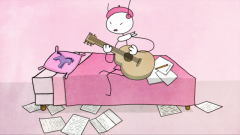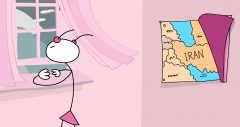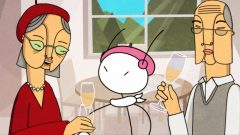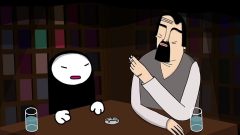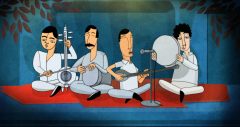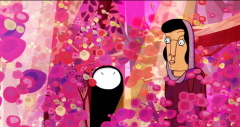In Window Horses, or its full name Window Horses – The Poetic Persian Epiphany of Rosie Ming, many characters keep asking the main protagonist, a Stick Girl in an otherwise fully formed character designs, why is she wearing a chador, in which she’s unable to reply. It’s her first trip to go overseas, so she just tries to fit in. For she’s blank state, you see, having little to no idea about the outside world, or even the poetry world. Rosie Ming, her name – herself a half-Chinese half-Persian who living in Canada, working in a fast food restaurant while writing poems (to be more exact, singing poems) as her hobby. She self-published her first book title “My Eye-full Poems by a person who has never been to France” and her greatest wish is to travel to France, the land of love and poetry. God listens to her well it seems, as she receives an invitation to attend to a poetry festival… in Shiraz, Iran. Throughout the course of the film, in a stranger land, she has a chance to listen to the voices of others, to staying open and curious with different cultures from different generation and learns a bit about herself and her family situation.
There’s one thing I can say for sure, Window Horses’ most obvious charm come from the fact that it feels like nothing else you’ve seen, especially in animation medium; the film whose main setting is in a poetry festival, a main character that is multiracial and the cast contain characters from many different backgrounds. Partly due to its unique appeal, the director Ann Marie Fleming had a bit of difficult time funding it, so she decided to crowdfund the project instead and it took her nine years to finally bring this lovely feature to life. The main character Rosie, a Stick Girl, has been the director’s own avatar for most of her career (the director herself is a half-Asian), and her simple design, both mean as a blank page, who despite not having a lot of experience, goes out to the world with curiosity and willingness to learn the world and all the things she can from other people; and as a simple likable character we can all root for and feel empathy with.
While the main plot is about Rosie visiting Iran, Window Horses isn’t strictly about her tale, but she serves as our window for the tales of other poets, the tale of Iran, and the tale of her father, who she come to believe that he had abandoned her and her Mom when she was young. Putting together, those tales are messy and over the place, but that is exactly the point to demonstrate how inspiration can come from every corner of the world; it’s the love of art, of poetry that brings those people who have vastly different ethnical backgrounds and different experiences in life all together. In one of her poetry quest, she is handed a poem by a Chinese poet Di Di (in Mandarin of course), who requested her to recite his poem in English with her own take. In order to do that she has to translate them into Persian, and then from Persian to English; thus in a process she has a chance to learn more about both of her ancestors, the Chinese and the Persian.
The humor of Window Horses is on the bright side here, in fact, its whimsical and light-hearted nature really help strengthening the mood and the theme of the story. This trip, after all, is more like an adventure for Rosie, where every new thing she learned, every people she met brimming with curious eyes. She quickly remarks in most of the things, mostly innocent deadpan questions like “How is it everyone here knows everything about everything”. The struggles she experienced for her “offensive content” to the Persian culture, for example (ya know, in Iran, solo performances by women is considered mildly offensive and have been banned), or the background story of exiled Chinese poet Di Di, both show us the difference in cultural perception, and add the richness to this little world.
Another main portion of the film is about each poet reciting their poems, and the history of Iran and important figures in Persian poetry culture, in which each part is showcase of visual inventiveness from different directors, who experiment with new styles to fit the content of the poems they are representing. (Fleming’s main job in those segments was to composite them into a cohesive whole). The history part doesn’t really sell it for me, mostly because it feels more like an educational Discovery Chanel on TV rather than fitting into this plot’s content; but the poem parts are easily one of the best strength of Window Horses. The director Fleming gave a smart decision to have all the poems reciting in their own languages without the subtitle. As a result, us as viewers don’t really understand what they’re talking about, but feel it. It’s the beauty of poetry. It’s not about the meaning, but the rhythms. Fleming also commented later in her interview that she wanted those poems to be some kind of code, viewers don’t need to understand it because they might get distracted from the main story, but if they wanted to, they can dig deeper to those contents because ther’s a whole world of art buried underneath it.
And then her little story about her parents, especially her father’s life come into light and was told to her by different people, most of them have known him at some point of his life. Her father’s backstory come a bit heavy-handed at times as it again touches upon the Iran Revolution and the refugees, but they do it without the expense of emotional drama of familial bond at its heart, so as messy as it is, it has its merits. Rosie’s grandparents, voiced beautifully by Nancy Kwan and Eddy Ko (If you have no idea who Nancy Kwan is, she was one of the first Asian-born actress played a pivotal role in the acceptance of actors of Asian ancestry in major Hollywood film roles) have some really great scenes of overprotective grandparents who must do anything to avoid their kid getting hurt, but hurts her instead by not telling her everything.
Wildly imaginative, sensitively portray the richness of multi-cultures and the love for poetry, at the same time bright and optimistic enough to bring hopeful sentiments to some otherwise grim and dark topics and a full delight from start to finish, Window Horses is a total winner in my book. Although feature a wide array of cast, it’s ultimately a personal story of Rosie to reach the world, learn few new things from other, appreciate more about her backgrounds and grown into her own at the end. Window Horses is a little story that worth telling.

